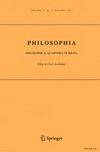规范错误理论与不自毁:对案例的答复
IF 0.5
4区 哲学
0 PHILOSOPHY
引用次数: 0
摘要
许多哲学家声称,规范性错误理论家致力于 "错误理论是真的,但我没有理由相信它 "的主张,这在一些人看来是自相矛盾的。凯斯(2019)声称,规范性错误理论家无法避免这一悖论。在本文中,我们认为首先不存在悖论,也就是说,一旦我们澄清了 "理由 "一词的歧义,无论是错误论者一方还是那些声称存在自我挫败问题的一方,都不存在悖论。在澄清之后,我们也会对自我挫败的本质究竟是什么提出怀疑。本文章由计算机程序翻译,如有差异,请以英文原文为准。
Normative Error Theory and No Self-Defeat: A Reply to Case
Many philosophers have claimed that normative error theorists are committed to the claim ‘Error theory is true, but I have no reason to believe it’, which to some appears paradoxical. Case (2019) has claimed that the normative error theorist cannot avoid this paradox. In this paper, we argue that there is no paradox in the first place, that is once we clear up the ambiguity of the word ‘reason’, both on the error theorist’s side and those that claim that there is a self-defeat problem. Upon clarification, we also raise scepticism to what exactly the nature of self-defeat is meant to be.
求助全文
通过发布文献求助,成功后即可免费获取论文全文。
去求助
来源期刊

PHILOSOPHIA
PHILOSOPHY-
CiteScore
0.90
自引率
20.00%
发文量
141
期刊介绍:
Founded in 1971, Philosophia is a much-respected journal that has provided a platform to many well-known philosophers, including Kenneth Arrow, A.J. Ayer, Roderick Chisholm, Bas van Fraassen, William Frankena, P.T. Geach, Alan Gewirth, Jaakko Hintikka, Richard Popkin, W.V.O. Quine, Gilbert Ryle, Marcus Singer, Peter Singer, J.J.C. Smart, P.F. Strawson, and many others. Philosophia also published papers of Ludwig Wittgenstein and Rudolf Carnap.
Philosophia is an international journal in scope, submissions and readership. The journal publishes contributions fitting within various philosophical traditions, but manifests a preference of the analytic tradition in the broad sense of commitment to clarity and responsibility.
Besides papers in the traditional subfields of philosophy and its history, Philosophia also publishes work on topical subjects such as racism, silence of God, terrorism, the nature of philosophy, emotion, AIDS, scientific discovery, punishment, modality, and institutional theory of art.
Philosophia welcomes a wide range of contributions to academic philosophy, covering all fields of philosophy. Contributions to the journal may take the form of topical papers, philosophical surveys of literature, symposia papers, short discussion notes, puzzles, profiles, book reviews and more extensive critical studies of new books. The journal includes a ''books revisited'' section where a book and its impact are reconsidered a decade or more after its appearance. Double-blind review procedure The journal follows a double-blind reviewing procedure. Authors are therefore requested to place their name and affiliation on a separate page. Self-identifying citations and references in the article text should either be avoided or left blank when manuscripts are first submitted. Authors are responsible for reinserting self-identifying citations and references when manuscripts are prepared for final submission.Please read our Editorial Policies carefully before you submit your paper to this journal https://www.springer.com/gp/editorial-policies
 求助内容:
求助内容: 应助结果提醒方式:
应助结果提醒方式:


